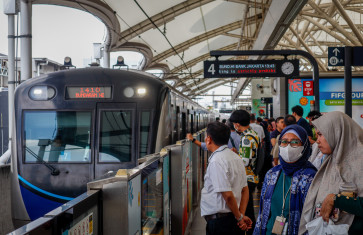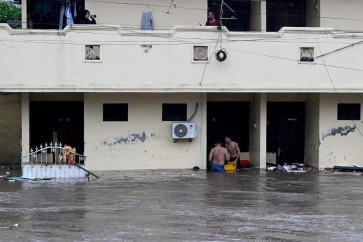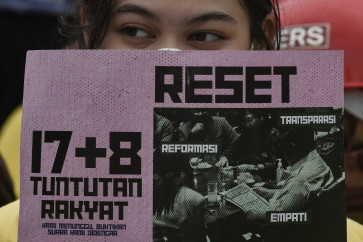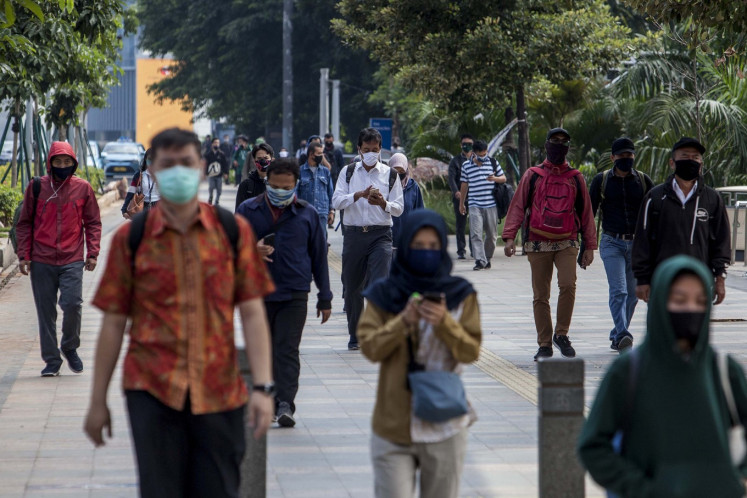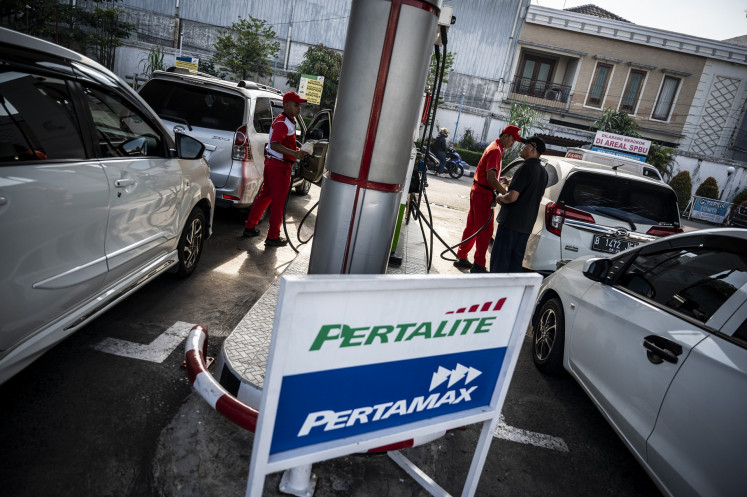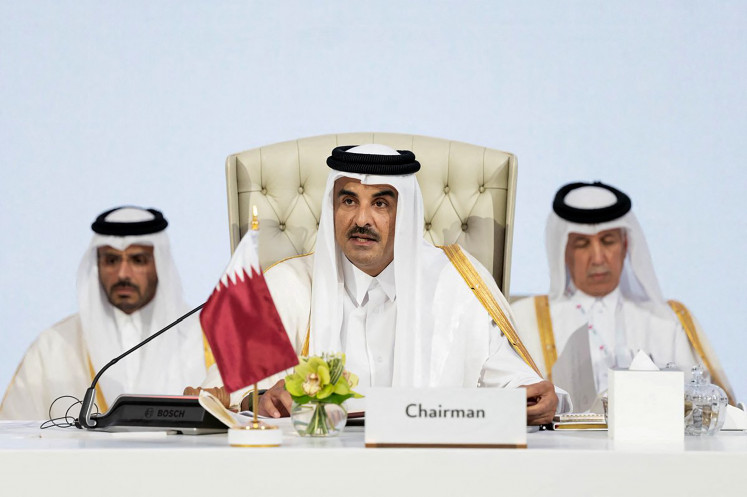Popular Reads
Top Results
Can't find what you're looking for?
View all search resultsPopular Reads
Top Results
Can't find what you're looking for?
View all search resultsCorruption scandals plague national soccer
Indonesia has made a lot of efforts to forge its national soccer team into a squad respected in Asia and possibly the world
Change text size
Gift Premium Articles
to Anyone
Indonesia has made a lot of efforts to forge its national soccer team into a squad respected in Asia and possibly the world. However, recent accusations of massive corruption — with match-fixing at the center of public attention — have tainted these efforts. The Jakarta Post’s Safrin La Batu, Liza Yosephine, Dwi Atmanta and Imanuddin Razak explore how the cases have continuously prevented our country from becoming a soccer powerhouse, at least in the Southeast Asian region.
Numerous corruption cases have recently engulfed Indonesian soccer, implicating several individuals connected to the Soccer Association of Indonesia (PSSI) and triggering demands to reform the organization and improve the national team.
The PSSI found itself in the spotlight after executives of several local clubs reported to the police various match-manipulation schemes, known also as match-fixing, saying they had done so to “save Indonesian soccer”. The police have responded by forming a special taskforce to probe the allegations.
Sixteen individuals have been named suspects, including 15 who have been charged with bribery. At least three PSSI executives are implicated, including Joko Driyono, the former acting chairman of the association. Joko has so far been charged only with rigging the evidence after investigators searched his apartment recently.
The accusations of massive corruption in Indonesian soccer surfaced after Lasmi Indaryani, a former manager of Persibara Banjarnegara, reported to police an alleged match-fixing scam by former PSSI executive committee member Johar Ling Eng, who has also been named a suspect.
Lasmi said in a recent televised interview that she had paid Rp 100 million (US$6,998) to win a match in the stages prior to the finals in the third-tier Liga 3, adding that she had also been asked to pay Rp 500 million to host the final match.
Her father, Banjarnegara Regent Budhi Sarwono, said they had spent a total of Rp 1.3 billion for various services promised to them.
Januar Herwanto, the manager of Madura FC in East Java, had a similar story. In the same interview, Januar said he had once been contacted by a person named Hidayat, then a member of the PSSI executive committee, to broker a deal when his club was about to face PSS Sleman.
Hidayat offered him Rp 150 million to let his team lose to PSS Sleman in a decisive second-tier league match, according to Januar. Hidayat denied allegations that he brokered attempts to fix the match, but a few days later he resigned from the PSSI.
“It is possible that more suspects will be named,” said Sr. Comr. Edi Ciptianto, the taskforce’s head of analysis and evaluation.
“We want to make sure the police will not lose steam in this case,” Edi said when asked whether the police would go after all other persons, including higher ranking officials potentially involved.
Police intervention in soccer is rare because of strict regulations from world soccer governing body FIFA, which prohibits government intervention in the sport.
In 2015, the Indonesian national team and clubs were banned by FIFA from playing in all tournaments after the Youth and Sports Ministry suspended the PSSI following a rift between the two organizations. FIFA considered the ministry’s suspension of the PSSI a form of government intervention in soccer.
Allegations of foul play were typically settled through the PSSI’s internal mechanism because of a fear of over-intervention in the sport. Suspects only faced potential bans — either temporary or permanent — or fines, rather than criminal charges.
As a result, foul play allegations remained largely untouched by law enforcement authorities.
A big case of match-fixing, known as Sepak Bola Gajah, made headlines in 2014. The case was related to a quarterfinal match between PSS Sleman and PSIS Semarang. All five goals of the match, three for PSS Sleman and two for PSIS Semarang, were own goals. Both teams had allegedly been ordered to produce own goals to avoid facing Borneo FC in the semifinals.
The two teams, of course, denied the allegations, but PSSI’s investigation confirmed foul play. The federation imposed a life ban on several individuals, including players and coaches from both teams. The majority of them, however, returned to the field in 2017, as then-PSSI chairman Edy Rahmayadi lifted the ban.
No police investigation of the matter has been reported.
One humiliating scandal concerned alleged match-fixing during the final of the 2010 ASEAN Football Federation (AFF) Championship, in which Indonesia lost to Malaysia 2-4. Indonesia’s failure to win the championship was shocking, as it had handily beaten Malaysia in the group stage of the same championship with a score of 5-1.
The surprising defeat fueled speculation of match-fixing in the 2010 AFF championship final. The Indonesian team manager for the 2010 AFF championship, Andi Darussalam Tabusala, only recently revealed that a number of Malaysians had admitted to “approaching some Indonesian players” ahead of the two legs of the finals. He appeared to be referring to so-called runners — intermediaries between bookies and bribed players or officials.
A former captain of the Indonesian national team acknowledged that match-fixing had become a widespread practice in recent years, from the top level of the PSSI down to the lowest tier of the league.
“The difference now is that the virus has entered all structures within our soccer,” said Ferril Raymond Hattu, who played for two decades beginning in the 1970s. He was the team captain when Indonesia won gold at the 1991 Southeast Asian (SEA) Games.
“For a long time, [corruption] cases were brought to an end only through the federation’s internal mechanism,” said Kesit Handoyo, a soccer observer.
“Today, there are concerns that the police stepping in could trigger another FIFA ban,” Kesit added.
Analysts believe corruption scandals that have plagued Indonesian soccer are one reason for the national team underperforming in Asia, let alone on the world stage. They believe corruption is the epitome of mismanagement inside the PSSI and hence demand the soccer body undergo a total reform to ensure the quality of the national team.
“It is unbelievable that our federation, whose officials are tasked with training and developing our national team, are involved in this kind of dirty work,” said Kesit.
“This [PSSI] is like a pool. We need to clean its water and change its fish. If we don’t change the fish, they will eventually contaminate new fish,” said Akmal Marhali, the chairman of an NGO called Save Our Soccer (SOS).
Akmal, who said he had eavesdropped on some conversations on alleged match-fixing, suspected that the practice might be massive in scale and that many more PSSI officials and local clubs could be involved.
During a dialogue held recently at the Jakarta Police, Akmal suggested the police go after more high-profile individuals who might be involved.
“For more than 20 years, the actors have been the same,” Akmal said.
Corruption scandals have also rocked some of the major soccer countries in the world.
In 2005, German soccer was hit by revelations of a 2 million euro ($2.26 million) match-fixing case, in which referee Robert Hoyzer confessed to taking money for fixing both the second and third division of the Regionalliga and the German Cup. It was considered one of the biggest scandals in German soccer history.
A year later, in Italy, Juventus was relegated from Serie A to Serie B and stripped of two scudetto championships because of its role in the calciopoli case, the biggest match-fixing scandal in world soccer history. Lazio and Fiorentina were originally supposed to join Juventus in Serie B, but had their relegations reversed on appeal. Both teams, though, were handed stiff point deductions for the following season, as well as AC Milan and Reggina.
Back in Indonesia, PSSI has formed an ad-hoc integrity committee, which could strengthen the body’s ability to settle foul play allegations internally.
PSSI executive committee member Gusti Randa said the committee had discussed with police the possibility of having a mutual memorandum of understanding (MoU), which could limit police investigation only to cases considered criminal.
“That is why the PSSI has formed an ad-hoc integrity committee aimed at settling the issue with the police,” Gusti told the Post.
“Based on the MoU, we can [determine] which one is criminal and which one is soccer-related. When it falls within the realm of soccer, let it be settled by us. If it is a crime, the police can go ahead,” Gusti said.
Analysts, however, are worried the MoU could dissuade the police from becoming involved further to correct the Indonesian soccer by arresting anyone who might have been involved, especially the big fish.
“For anything that could lead to legal charges, the police should be involved,” Emerson Yuntho, a soccer analyst, told the Post. “Match-fixing involves money.”
Analysts have argued that any advancement in soccer depended on the PSSI improving the national soccer team. For the time being, however, let the police clean up all the dirt in Indonesian soccer until the country has professional organizers who support sportsmanship above all other things.


